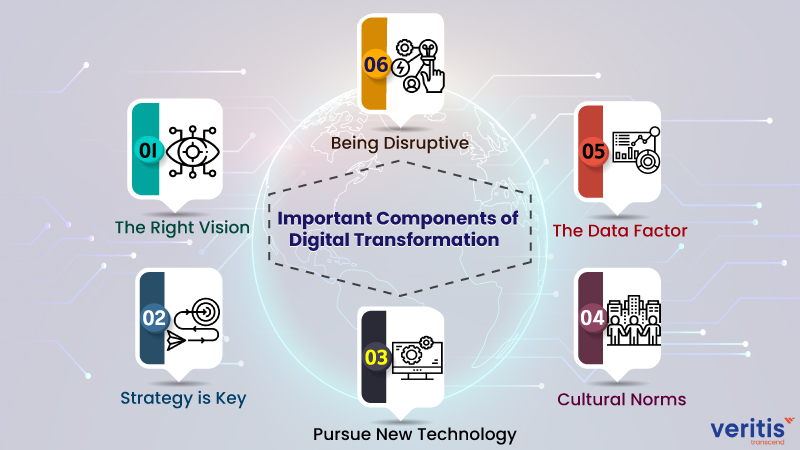
As we globally move towards digitization and virtualization, the importance of businesses to undergo components of digital transformation is rising for meeting changing client expectations and delivering seamless solutions as well as superior experiences.
As per research by MIT, businesses which successfully adapt digital transformation are 26% more in profit in comparison with their counterparts. Through a sound digital transformation strategy, businesses can streamline their long-term vision, evolve in terms of the applications, systems, and workflows and redefine the way business is done.
Redeploying resources, reinventing the value chain and elevating customer relationships are some crucial steps in the digital transformation process. Through this blog, we put the spotlight on the important components of digital transformation.
Important Components of Digital Transformation

The right vision
Perhaps an integral aspect of digital business transformation is bringing about the change on a larger scale i.e at the organizational level and establishing the right digital culture. By taking into consideration the various gaps, threats and opportunities, a suitable strategy should be leveraged to improve the overall customer experience, competitive position in the market, revenue streams and business operations.
Transformational leadership plays a crucial role as it inspires people to bring about change through agile thinking, transparency and set standards in place.
Strategy is key
Along with strong leadership, organizations must come up with a time-bound and neatly charted digital transformation strategy which should capture what are the pain points, the actual target outcome of the transformative journey and offering an elevated client experience.
Through a firm end goal in mind, organizations would be able to bring about the necessary cultural and technological changes for ensuring digital transformation takes place. If a strategic approach isn’t taken, then a visible difference would not be observed at the business process, operations and everyday workflows instead there would be a change in a piecemeal fashion.
Pursue new technology
As opposed to popular belief, technology should come in the final stages of a good digital transformation strategy. Once a new strategy is implemented, cultural changes are made, and the business model is established, then organizations should evaluate their current technological set up to assess the data gaps or functionality issues.
Organizations must work towards adapting the analytic insights generated from the new technologies for ensuring data-driven decision making leading to digital transformation. Though digital transformation starts as a one-time approach, it should instead be treated as an iterative cycle based on failure, evaluation and implementation.
Based on cultural transformation, new business models and enhanced operational workflows emerge that contribute to driving technological investments.
Though the path to digital transformation could be challenging and expensive, businesses who take the pain to transform open up avenues to higher innovation, reduced time-to-market, new revenue streams and happy clientele.
Cultural Norms
In the current era, the risk of not taking up a proactive, disruptive approach to transform your business is far more than to take a completely novel, innovative approach to digital transformation. Organizations must venture beyond their regular territory of conventional markets, clientele and tried-and-tested business models.
A good example would be GE (General Electric) who took cues from IoT pioneers for digitizing, remote monitoring and optimizing their industrial product line. This helped in boosting GE’s position in the market and competitors.
One of the key factors for digital transformation, a culture of risk-taking is an important aspect for organizations and trying small experiments based on feedback from clientele is a great way to shape a strategy.
The Data factor
Another key factor influencing digital transformation is leveraging data-related technologies to ensure business decision-making through valuable insights. By utilizing Machine Learning and AI, organizations can understand patterns in clientele behavior data, purchase patterns, preferences and accordingly offer customized solutions that cater to their needs. AI is a beneficial technology for predictive analysis and helping carry out strategy development.
Being Disruptive
To bring about digital transformation, organizations need to adapt disruptive technologies and elements like enterprise analytics platforms, automation and simplifying collaboration tools. These are of paramount importance in re-defining or optimizing the entire value chain. These help the organizations in eliminating obsolete methods with faster solutions and an integrated approach across various levels of the enterprise. This also helps in delivering the value proposition and exponential growth.
How Veritis aims to help

Whether you are an IT organization or a retailer, we believe that Veritis can help you transform, transcend and digitize to serve your clients better. We are known for our IT services in the North American region and believe in taking small, realistic, and strategic steps to bring about transformation in the true sense.
Also Read:
